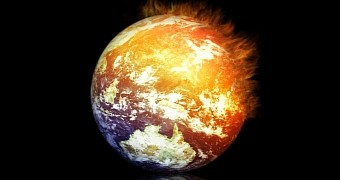This past Friday, researchers with the US National Aeronautics and Space Administration (NASA) and the National Oceanic and Atmospheric Administration (NOAA) confirmed that 2014 was indeed the absolute hottest year ever documented since record keeping began decades ago.
The news that 2014 was the warmest year in modern history was first brought to us by scientists with the Japan Meteorological Agency earlier this month. In case anyone doubted these guys and gals, this week's NASA and NOAA reports prove they were right.
Just how hot was the year 2014?
In their report, NOAA scientists say that last year's average surface temperature was one of 14.58 degrees Celsius (58.24 degrees Fahrenheit). When compared to the 20th-century average, this figure represents an increase of 0.69 degrees Celsius (1.24 degrees Fahrenheit).
“The year 2014 was the warmest year across global land and ocean surfaces since records began in 1880. The annually-averaged temperature was 0.69°C (1.24°F) above the 20th century average of 13.9°C (57.0°F), easily breaking the previous records of 2005 and 2010 by 0.04°C (0.07°F),” reads NOAA's report.
NASA researchers, who calculate the global average surface temperature slightly differently, found that the year 2014 had an average temperature of 14.68 degrees Celsius (58.42 degrees Fahrenheit). This figure marks a 0.68 degrees Celsius (1.22 degrees Fahrenheit) increase over the period 1951-1980.
What's more, scientists with NASA say that, since 1880 until now, our planet's temperature has increased by about 0.8 degrees Celsius (1.4 degrees Fahrenheit). Interestingly enough, it appears that most of this warming occurred over the past three decades.
The planet stands to soon get even hotter
NASA researchers say that, contrary to what some might argue, the fact of the matter is that this increase in global average surface temperatures is due to man-made global warming. As explained in the video below, it's greenhouse gas emissions that turned 2014 into the hottest year in modern history.
The specialists stress that, under a business-as-usual scenario, our planet will surely get even hotter in the years to come. This will upset not just natural ecosystems but also agricultural practices. Besides, the expected increase in global temperatures will go hand in hand with rising sea levels.
“While the ranking of individual years can be affected by chaotic weather patterns, the long-term trends are attributable to drivers of climate change that right now are dominated by human emissions of greenhouse gases,” said Gavin Schmidt with NASA's Goddard Institute of Space Studies.

 14 DAY TRIAL //
14 DAY TRIAL // 